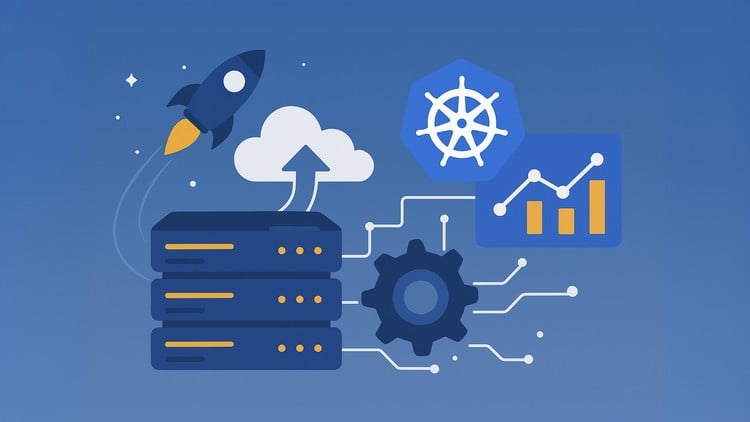
CKA, CKAD & CKS: 1500 Certified Questions Covering Pod Scheduling, Networking, Security, Storage, Observability & DevOps
👥 577 students
🔄 October 2025 update
Add-On Information:
Note➛ Make sure your 𝐔𝐝𝐞𝐦𝐲 cart has only this course you're going to enroll it now, Remove all other courses from the 𝐔𝐝𝐞𝐦𝐲 cart before Enrolling!
-
Course Overview
- This ‘Kubernetes 3-in-1’ course provides an integrated and comprehensive preparation path for achieving the three most vital Kubernetes certifications: Certified Kubernetes Administrator (CKA), Certified Kubernetes Application Developer (CKAD), and Certified Kubernetes Security Specialist (CKS).
- At its core, the program offers an extensive collection of 1500 certified questions, specifically designed to simulate the practical, hands-on, and performance-based nature of the actual exams, ensuring rigorous preparation.
- The curriculum systematically covers all critical Kubernetes domains, including advanced Pod Scheduling, robust Networking, comprehensive Security, persistent Storage solutions, effective Observability, and modern DevOps practices, reflecting the latest industry standards.
- Updated in October 2025, this course guarantees relevance with current Kubernetes versions and exam objectives, providing the most up-to-date knowledge for certification success.
- It’s an ultimate resource for engineers and architects aiming to transform theoretical understanding into expert-level operational proficiency and validated professional credibility across multiple Kubernetes specializations.
-
Requirements / Prerequisites
- Linux CLI Basics: Fundamental command-line interface (CLI) proficiency in Linux, including basic navigation, file manipulation, and process management.
- Containerization Concepts: A basic understanding of containers, their lifecycle, and familiarity with a runtime like Docker or containerd is highly recommended.
- Networking Fundamentals: Knowledge of basic networking principles such as IP addresses, ports, DNS, and common protocols like HTTP.
- YAML Syntax (Beneficial): Prior exposure to YAML for configuration files is helpful but not strictly required, as the course will reinforce its usage.
- Commitment to Practice: A strong desire for hands-on learning and dedication to practicing complex technical scenarios under timed conditions.
-
Skills Covered / Tools Used
-
Key Skills Developed:
- Cluster Administration (CKA Focus): Deploying, upgrading, scaling, and maintaining Kubernetes clusters; managing core primitives like Pods, Deployments, and DaemonSets; configuring networking and storage solutions; and advanced troubleshooting.
- Application Development (CKAD Focus): Designing and deploying containerized applications on Kubernetes; configuring resources with ConfigMaps and Secrets; implementing probes; optimizing resource requests/limits; and debugging application issues.
- Security Specialization (CKS Focus): Hardening Kubernetes clusters and applications; implementing robust network policies and RBAC; securing container images and runtime environments; and establishing auditing and logging for security compliance.
- Cross-Domain Proficiency: Advanced `kubectl` usage, manifest creation and debugging, performance optimization, and strategic utilization of Kubernetes documentation.
-
Primary Tools & Technologies:
- `kubectl`: The primary command-line tool for interacting with Kubernetes clusters.
- `kubeadm`: For deploying and managing Kubernetes clusters (relevant to CKA).
- `etcdctl`: For direct interaction with the cluster’s key-value store (relevant to CKA/CKS).
- Container Runtimes: Understanding of `containerd` or Docker for container management.
- Linux Utilities: Essential CLI tools like `systemctl`, `journalctl`, `grep`, `awk`, `sed` for system and log analysis.
- YAML: For defining Kubernetes object configurations.
- Security Tools Concepts: Exposure to concepts of tools like Falco, Trivy, Open Policy Agent (OPA) for policy enforcement and runtime security.
-
-
Benefits / Outcomes
- Attain Triple Certification: Successfully prepare for and achieve CKA, CKAD, and CKS certifications, validating your expertise across the entire Kubernetes ecosystem.
- Holistic Kubernetes Mastery: Gain comprehensive practical skills in administering, developing for, and securing Kubernetes environments from the ground up.
- Accelerated Career Growth: Significantly enhance your profile for high-demand roles in DevOps, Cloud Engineering, SRE, and Cloud Native Architecture.
- Robust Troubleshooting Acumen: Develop advanced diagnostic capabilities to efficiently identify and resolve complex issues within Kubernetes clusters and applications.
- Expertise in Secure Operations: Master best practices for securing Kubernetes infrastructure and applications, minimizing vulnerabilities and ensuring compliance.
- Confident Problem-Solving: Build the ability to confidently approach and solve real-world Kubernetes challenges under pressure.
-
PROS
- Integrated Triple Certification Path: Uniquely prepares learners for CKA, CKAD, and CKS exams in one cohesive and efficient program.
- Extensive Hands-on Practice: Offers an unparalleled volume of “1500 Certified Questions” for practical, scenario-based exam simulation and skill reinforcement.
- Industry-Current Content: Guaranteed up-to-date with an “October 2025 update,” ensuring alignment with the latest exam objectives and Kubernetes versions.
- Comprehensive Skill Set: Develops a broad and deep understanding of Kubernetes administration, development, and security, making graduates highly versatile.
- High Return on Investment: Maximizes learning efficiency and career impact by consolidating preparation for three crucial certifications.
-
CONS
- Substantial Time & Dedication Required: The extensive curriculum covering three certifications and 1500 practice questions necessitates a considerable commitment of time and focused effort from learners.
Learning Tracks: English,IT & Software,IT Certifications
Found It Free? Share It Fast!